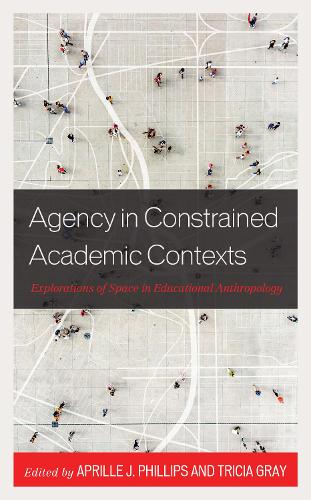
Agency in Constrained Academic Contexts: Explorations of Space in Educational Anthropology
(Hardback)
Publishing Details
Agency in Constrained Academic Contexts: Explorations of Space in Educational Anthropology
By (Author) Aprille J. Phillips
Edited by Tricia Gray
Contributions by Jacob M. Barry
Contributions by Christine Finnan
Contributions by Tricia Gray
Contributions by Manson N. Johnson
Contributions by Bradley Levinson
Contributions by Samantha Lopez
Contributions by Jessica Masterson
Contributions by Allison Mattheis
Bloomsbury Publishing PLC
Lexington Books
4th May 2021
United States
Classifications
Professional and Scholarly
Non Fiction
Education / Educational sciences / Pedagogy
Ethnic groups and multicultural studies
306.43
Physical Properties
Hardback
164
Width 164mm, Height 228mm, Spine 18mm
426g
Description
Agency in Constrained Academic Contexts examines how social agents construct autonomous spaces in the context of neoliberal education. The contributors to this edited collection consider the ways that educators, students, and families assert agency, claim space, and thereby reshape the constraints imposed by the durability of the academic institutions of which they are a part.
Reviews
With its original and compelling theorization of space, this volume is on the leading edge of current work in educational anthropology. Agency in Constrained Academic Contexts shows how students, teachers, parents, and other stakeholders are able to draw on their own spatial agency to develop and employ specific local tactics to overcome the constraints of educational institutions. With contributions from a stellar lineup of anthropologists of education who examine these processes in a variety of global locations, and written to appeal to a wide audience, this book shows how new theory and research from educational anthropology can point the way to more liberating and humane educational practice and policy.
-- Peter Demerath, University of Minnesota, University of Minnesota; former president, Council on Anthropology and EducationAgency in Constrained Academic Contexts is a must-read for anyone who is interested in the power and paradoxes inherent within all education spaces. This edited volume scrutinizes debates regarding the theorization of space, power, inequality, exclusion, and agency in relation to their sociohistorical and socio-political contexts. The contributors bring to life these debates via an anthropological spotlight on the power education has to conserve and constrain, but also, perhaps more importantly, on its ability to challenge hegemonic practices and transform the world we live in.
-- Lisa Russell, University of HuddersfieldAuthor Bio
Aprille Phillips is assistant professor of education at Southern Oregon University
Tricia Gray is assistant professor at the University of Nebraska-Lincoln.
